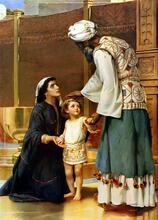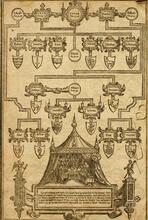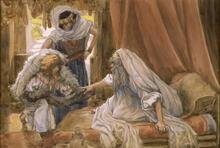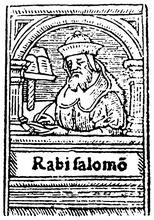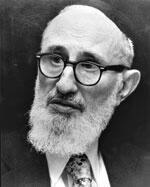Mother of Samson: Bible
Like so many biblical women, Samson’s mother is described as infertile. Like so many Biblical women, she is also nameless. Though her name has been lost to time, her impact has not. When God granted her a son and commanded her and her husband to raise the child as a Nazirite, she herself had to keep the Nazirite vows so that her son would do the same. Her son Samson’s Nazirite vows gave him strength from God, and he would go on to become one of the Judges, leading the Israelites against the Philistines.
The birth announcement of a son to a sterile woman is a typical biblical scene. Here no background is offered—whether like Sarah the woman was old, or like Rachel she complained to her husband about childlessness, or like Sarah and Rachel she tried other means of obtaining a child. She does not pray for a child, as does Hannah, nor does her husband pray for her, as Isaac prays for Rebecca. Even her name is not reported, though her role in the story is as important as that of her husband, Manoah.
A Divine Messenger
She is alone when the divine messenger appears to her to announce birth. The Nazirite; person who vows to abstain for a specific period (or for life) from grape and grape products, cutting his hair, and touching a corpse.Nazirite injunctions against drinking alcohol and eating unclean food are placed upon her, since the child is to be a Nazirite “from birth” (Judges 13:5). She immediately shares the news with her husband, but apparently this is not enough for him and he prays to God to send the man again “to us” to “teach us” (v. 8). God grants the prayer, but the messenger appears again to the woman only (to underscore this point, the text adds in v. 9, “and Manoah her husband was not with her”). She must bring Manoah to the man. When Manoah questions the messenger, he never receives as much information about the child as his wife does (he never hears the prohibition against cutting the boy’s hair or that Samson will begin to deliver Israel from the Philistines).
The woman is more perceptive than her husband. Although they both call the emissary a “man of God” (a term for a prophet) until he reveals his divine identity (v. 20), she senses at once something otherworldly about him (v. 6) and does not, as Manoah later does, ask about his ineffable name.
The woman and her husband together witness the messenger’s ascension. Upon realizing that they have seen a divine being, Manoah fears they will die—a common response to such a revelation—but the woman recognizes a divine purpose behind the revelation, and thus assures Manoah that they will not die. Usually, in such circumstances, this assurance is given by God.
Samson’s Life
The woman, as is frequently the case in the Bible, names the child. She is included in the events leading up to Samson’s marriage, but her role in arranging it is not clear (parents typically arranged their children’s marriages). Samson tells both his father and his mother about seeing the woman he wants to marry, and both parents object to his choice of a Philistine (neither knows that this is all part of a divine plan). Both parents accompany Samson to Timnah in Judg 14:5, but his mother is not included in v. 10. Samson does not tell either parent about killing the lion or finding honey in its carcass (he gives both some honey to eat). These two events give rise to his famous riddle. Samson’s question “I have not told my father or my mother. Why should I tell you?” (14:16) indicates that the man’s primary allegiance is to his parents, not to his wife.
Exum, J. Cheryl. Fragmented Women: Feminist (Sub)versions of Biblical Narratives. Sheffield, England: 1993.
Fuchs, Esther. “The Literary Characterization of Mothers and Sexual Politics in the Hebrew Bible.” In Gender and Law in the Hebrew Bible and the Ancient Near East, edited by Victor H. Matthews, Bernard M. Levinson, and Tikva Frymer-Kensky, 79–96. Sheffield, England: 1998.
Meyers, Carol, General Editor. Women in Scripture. New York: 2000.
Reinhartz, Adele. “Samson’s Mother: An Unnamed Protagonist.” Journal for the Study of the Old Testament 55 (1992): 25–37.

